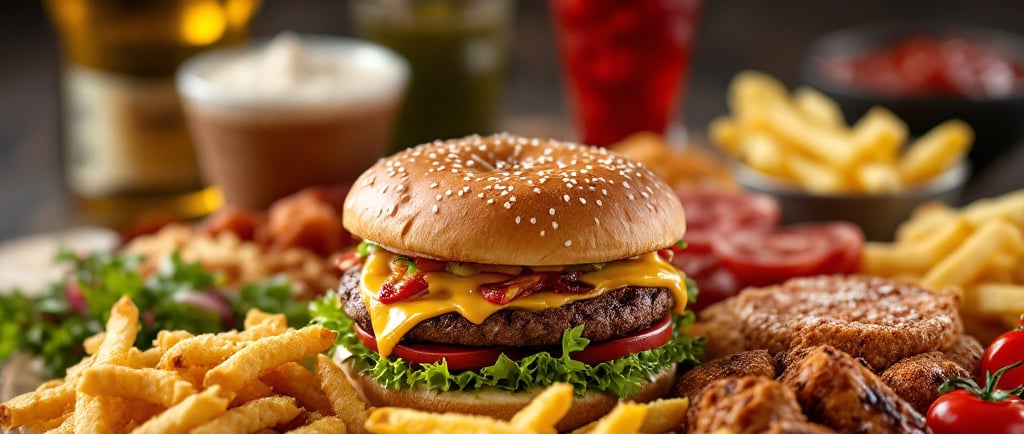Understanding the Link Between Overeating and Depression: Steps to Break the Cycle
Overeating and depression can feel like two sides of the same coin, feeding off each other in an exhausting loop. Emotional triggers, stress, and feelings of sadness often push people toward food as a form of comfort. While this might bring momentary relief, it can also lead to feelings of guilt and physical discomfort, deepening mental health struggles. Biological factors, such as changes in brain chemistry, add another layer to this cycle. By addressing both the emotional and physical aspects, it's possible to break free of this pattern.
BINGE EATINGDEPRESSIONFOOD ADDICTIONHOLISTIC MENTAL HEALTHANXIETYWEIGHT LOSSEMOTIONAL EATINGOVEREATING
Chelsey Lahr, PMHNP-BC
4/5/20259 min read


Overeating and depression can feel like two sides of the same coin, feeding off each other in an exhausting loop. Emotional triggers, stress, and feelings of sadness often push people toward food as a form of comfort. While this might bring momentary relief, it can also lead to feelings of guilt and physical discomfort, deepening mental health struggles. Biological factors, such as changes in brain chemistry, add another layer to this cycle. By addressing both the emotional and physical aspects, it's possible to break free of this pattern. If you're exploring solutions, our holistic binge eating treatment can help.
The Emotional and Psychological Cycle of Overeating and Depression
Overeating often begins as a response to emotional stress, but the relief it provides is temporary at best. For many, food becomes a way to numb feelings of anxiety or depression, only for those emotions to resurface stronger later. If left unchecked, this behavior can spiral into a cycle that feels impossible to break. Let’s explore how this pattern unfolds and what can be done to change it.
Emotional Triggers: Stress and Comfort Eating
Stress has a sneaky way of convincing us food is the solution. When life feels overwhelming, comfort foods like sweets or salty snacks are often the first refuge. Why? These foods release dopamine, offering a short-term "high" that can ease emotional tension. It’s like hitting a mental pause button—but only temporarily.
Unfortunately, this relief doesn’t last. Once the dopamine levels drop, the original stressors return, often accompanied by physical discomfort or regret. Over time, stress-driven eating becomes less about hunger and more about seeking that fleeting sense of calm. Recognizing this pattern is a critical first step in making healthier choices.
The Role of Guilt and Shame
After a binge, feelings of guilt and shame are incredibly common. You might find yourself stuck in a loop of self-critical thoughts, asking, "Why do I keep doing this?" This self-blame doesn’t just go away—it compounds and feeds into existing depressive feelings.
Guilt over what you ate can lead to isolation, avoidance of social situations, and increased negative self-talk. These emotions then fuel further overeating as a coping mechanism. It’s a self-reinforcing loop that can feel impossible to escape, but recognizing the emotional connection here is key to breaking free.
Behavioral Patterns and Food Choices
What you eat also plays a significant role in how you feel mentally and emotionally. Processed foods high in sugar and unhealthy fats can actually worsen depressive symptoms by impairing brain function. Think of it this way: if your brain is running on subpar fuel, how can it possibly perform at its best?
Scientific research has shown links between poor diet and heightened symptoms of anxiety and depression. Craving junk food might seem harmless in the moment, but these choices not only impact physical health—they also exacerbate mental health challenges. Making small changes, like reaching for nutrient-dense foods, can support long-term emotional stability.
Breaking the Psychological Loop
Interrupting the cycle of overeating and depression requires both awareness and actionable steps. Start with simple, manageable strategies. Journaling your emotions before you eat can help you distinguish between actual hunger and emotional triggers. Mindful eating techniques, like slowing down during meals, make a big difference too.
Another way to take back control is by introducing positive habits that support mental health. Regular exercise, staying hydrated, and setting realistic expectations for yourself are powerful tools. If you’re not sure where to begin, I recommend these 9 self-help solutions for reducing symptoms of depression. The key is to focus on progress, not perfection, and to celebrate even the smallest victories along the way.
The Biological Link Between Overeating and Depression
The connection between overeating and depression isn’t just emotional—it’s deeply rooted in biology. From hormonal shifts to inflammation and even your gut health, many biological processes overlap and amplify this cycle. Let’s break it down to uncover what’s really happening in our bodies.
Hormonal Changes and Appetite Dysregulation
Have you ever noticed that stress makes you crave sugary or fatty foods? That’s not a coincidence. When you’re under stress, your body increases cortisol production. This stress hormone not only raises your appetite but also makes you store fat more easily—especially around the belly. Elevated cortisol levels can also intensify depressive symptoms, creating a vicious cycle of eating and feeling worse.
On top of that, serotonin, often dubbed the "feel-good hormone," plays a huge role in regulating mood and appetite. Low serotonin levels are linked to both depression and cravings for carbohydrates. It’s as if your brain is searching for a quick energy fix to make up for the imbalance, but that fix often backfires. If you’re curious about related biological factors impacting mental health, check out how blood sugar imbalances connect to mental health issues like depression and anxiety.
Inflammation and Its Impact on Mental Health
Chronic inflammation doesn’t just affect your joints or immune system—it can alter your brain function, too. Inflammation can disrupt the production of important neurotransmitters like dopamine and serotonin, making it harder for your brain to regulate mood and appetite. This connection is why you might feel mentally foggy or emotionally drained during times of stress or after overeating.
Emerging treatments, like low-dose naltrexone (LDN), are showing promise in targeting chronic inflammation to improve emotional balance. There’s growing interest in how these therapies can offer relief for those battling both overeating and depression. If this resonates, you might find helpful insights in our guide that covers how gut health and inflammation influence anxiety and depression.
The Gut-Brain Connection
Your gut isn’t called your "second brain" for nothing. The gut-brain connection plays a pivotal role in mental health and eating habits. An imbalanced gut microbiome can disrupt how your body and brain communicate, leading to stronger cravings, mood swings, irritability, and even symptoms of depression. For example, when your gut health is poor, it can lower the production of mood-regulating chemicals like serotonin, which is mostly created in the gut.
Foods that promote healthy gut bacteria—like probiotics, fiber, and fermented foods—can positively influence both your mental health and your relationship with food.
Understanding these biological factors is key to breaking the cycle between overeating and depression. With the right interventions, it’s absolutely possible to support your mental and physical health at the same time.
Holistic Approaches to Managing Overeating and Depression
Finding balance when dealing with overeating and depression can feel overwhelming. A holistic approach takes a step back to see the bigger picture: how the mind and body interconnect. By addressing physical health, mental health, and emotional well-being simultaneously, we can create a solid foundation for recovery. Let’s dive into some practical and effective strategies.
Nutritional Strategies for Mental Wellness
What you eat directly impacts how you feel, both mentally and physically. Incorporating key nutrients, like omega-3 fatty acids and magnesium, can significantly support emotional stability and overall brain function. Magnesium helps regulate neurotransmitters tied to mood, while omega-3s are known for their anti-inflammatory properties and brain-boosting benefits.
In some cases, introducing natural supplements tailored to your unique needs can make a world of difference. It’s essential to focus on nutrient optimization to ensure you're supporting your body in the best way possible. For more personalized guidance, take a look at nutrient optimization with psychiatric nurse practitioners.
Simple dietary changes, like adding more leafy greens, nuts, seeds, and fatty fish, are small but powerful steps. When combined with professional support, these adjustments can create a powerful ripple effect on mental health.
Medication-Assisted Treatments
For some individuals, medications can play an important role in breaking the overeating and depression cycle. Emerging treatments, like low-dose naltrexone (LDN), show promise in reducing emotional eating by addressing underlying inflammation and resetting reward pathways in the brain. Similarly, GLP-1 medications, including options like Zepbound, not only help manage appetite regulation but can potentially also aid in stabilizing mood.
These treatments offer a way to address physical and emotional symptoms simultaneously, making them a valuable component of a holistic care plan. Always consult with a qualified provider to determine if these options fit your unique situation.
The Power of Psychotherapy
Psychotherapy is another integral piece of the puzzle. Cognitive therapies, such as Cognitive Behavioral Therapy (CBT), help individuals identify and reframe negative thought patterns contributing to overeating or depressive feelings. This approach fosters healthier coping mechanisms and provides a safe space to process emotions. Tackling the root causes of overeating and depression means creating lasting change rather than just treating the symptoms.
Integrating Lifestyle Changes
Lastly, small but intentional lifestyle adjustments can amplify the impact of other interventions. Exercise, even a simple 20-minute walk, releases endorphins that naturally elevate your mood. Mindfulness practices, like meditation or journaling, provide tools to manage stress and keep you grounded. Structured routines, such as regular sleep schedules and consistent meal times, reduce unpredictability and build stability in your day.
It’s not all-or-nothing—every little effort adds to the larger picture. Need some practical examples? From exercise improvements to mindfulness practices, lifestyle changes are incredibly supportive for mental health recovery.
Practical Steps to Prevent Overeating and Support Mental Health
Preventing overeating while caring for your mental health involves small, intentional adjustments in daily habits. These steps don’t need to be overwhelming; they’re practical, actionable, and can create lasting change over time. Let’s explore some key strategies.
Mindful Eating Practices
Mindful eating is more than just a trend—it's a powerful way to rebuild a healthy relationship with food. The concept is simple: focus entirely on your meal when you’re eating. This includes paying full attention to the flavors, textures, and smells, as well as tuning into your body’s hunger and fullness cues.
Here’s how to incorporate mindfulness into your eating habits:
Slow Down: Take smaller bites and chew thoroughly, giving your brain time to register fullness.
Minimize Distractions: Turn off the TV, put down your phone, and focus solely on your meal.
Ask Yourself Questions: Am I truly hungry, or am I eating due to emotional triggers?
Practice Gratitude: Take a moment to appreciate the food, its taste, and the nourishment it provides.
Mindful eating isn’t about restriction—it’s about experiencing food fully and recognizing when you’ve had enough. For more insights, you can read about techniques like this in our guide on understanding intrusive food noise with binge eating.
Creating a Balanced Routine
A well-structured routine lays a strong foundation for better emotional and physical health. Consistency can reduce the triggers that lead to overeating by stabilizing your energy and mood.
Here are three vital areas to focus on:
Sleep Regularly: Aim for 7-9 hours of quality sleep per night. Poor sleep increases cravings and lowers impulse control.
Plan Your Meals: Prep your meals ahead of time to reduce the temptation of grabbing quick, unhealthy snacks when you're stressed or busy.
Get Active Daily: Regular movement, whether it's a morning walk or yoga session, helps regulate your appetite and boosts mood-enhancing hormones like serotonin.
Creating a regular framework for your day doesn’t just help curb overeating—it brings a sense of calm and predictability.
Seeking Professional Support
Sometimes, we need help beyond what self-guided changes can provide. Specialists trained in both mental health and eating behaviors can help you develop strategies tailored to your situation. If you live in Scottsdale, Arizona or Denver, Colorado, at Intrepid Mental Wellness, our compassionate experts are here to help.
You don’t have to navigate this journey alone. Seeking help is a powerful step toward lasting change. If you’re curious about holistic treatment options, consider exploring our service on holistic binge eating treatment.
By incorporating mindful eating, creating a balanced routine, and seeking professional advice, you can take meaningful steps toward reducing overeating and improving your mental health. Each step builds on the other, offering a practical way forward.
Conclusion
Addressing the interconnected challenges of overeating and depression requires a thoughtful and comprehensive approach. Through holistic strategies, including emotional awareness, better nutrition, and structured routines, we can make meaningful progress toward balance and recovery. Seeking professional support tailored to your specific needs is also key in turning insight into action.
At Intrepid Mental Wellness, we believe in the power of integrated care that considers every aspect of your well-being. With resources like holistic medication treatment, you're not just managing symptoms—but creating sustainable change. If you’re ready to take the next step, start by prioritizing both your mental and physical health.
Content on this website is not considered medical advice. Please consult with a licensed health care provider before making any medical or lifestyle changes.
References:
Mills, J. G., Thomas, S. J., Larkin, T. A., & Deng, C. (2020). Overeating and food addiction in Major Depressive Disorder: Links to peripheral dopamine. Appetite, 148, 104586. https://doi.org/10.1016/j.appet.2020.104586
Dingemans, A., Danner, U., & Parks, M. (2017). Emotion Regulation in Binge Eating Disorder: A review. Nutrients, 9(11), 1274. https://doi.org/10.3390/nu9111274
Kulak-Bejda, A., Bejda, G., & Waszkiewicz, N. (2020). Safety and efficacy of naltrexone for weight loss in adult patients – a systematic review. Archives of Medical Science, 17(4), 940–953. https://doi.org/10.5114/aoms.2020.96908
Chen, X., Zhao, P., Wang, W., Guo, L., & Pan, Q. (2023). The Antidepressant Effects of GLP-1 Receptor Agonists: A Systematic Review and Meta-Analysis. American Journal of Geriatric Psychiatry, 32(1), 117–127. https://doi.org/10.1016/j.jagp.2023.08.010
Hours
Monday 7 AM–4:30 PM
Tuesday 7 AM–4:30 PM
Wednesday 7 AM–4:30 PM
Thursday 7 AM–4:30 PM
Friday 7 AM–12 PM
Saturday, Sunday Closed


Providing compassionate holistic mental health care to Colorado and Arizona.
Phone: Colorado & Arizona 719-505-4404
Copyright © 2018-2025 Intrepid Mental Wellness, PLLC. All rights reserved | Privacy Policy | Terms & Conditions


Content on this website is not considered medical advice. Please consult with a licensed health care provider before making any medical or lifestyle changes.
Holistic mind & body supplements & products
Contact |
Shop |
Fax: 720-899-3575